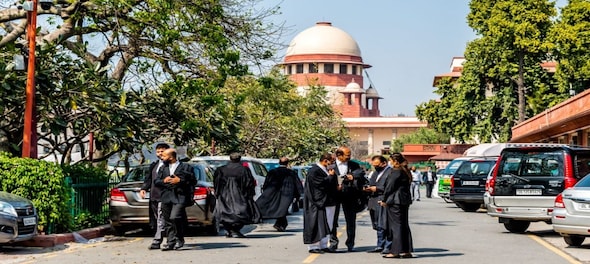
The Supreme Court on Tuesday rejected the Centre's curative plea seeking an additional Rs 7,844 crore from the Union Carbide Corporation's successor firms as compensation for the victims of the 1984 Bhopal gas tragedy.
The gas leak at the plant killed over 3,000 people, but the subsequent death toll has been far higher. It also caused much environmental damage.
A five-judge constitution bench led by Justice Sanjay Kishan Kaul had reserved its verdict on January 12. The bench comprises Justice Sanjiv Khanna, Justice Abhay S Oka, Justice Vikram Nath, and Justice J K Maheshwar.
The Centre has long been demanding additional funds from UCC’s successor firms but the claims have been rejected.
On January 12, the successor firms stated that the depreciation of the rupee since 1989, when the original settlement was arrived at, cannot be a ground to now seek a ‘top-up’ of compensation.
A timeline
On the night of December 2, 1984, about 42 tonnes of methyl isocyanate leaked from the Union Carbide India Limited (UCIL) plant in Bhopal, Madhya Pradesh. Investigations revealed that substandard operating and safety procedures led to the catastrophe.
ALSO READ | Bhopal gas tragedy verdict: SC rejects Centre's plea for more compensation from UCC's successor firms
Over 3,000 died on the day of the disaster, and the death toll rose to over 20,000 over the next few years, according to several reports.
A suo motu FIR was registered on December 3, 1984, by the Union government against the executives and employees of UCC and UCIL.
On December 6, 1984, the investigation was handed over to the Central Bureau of Investigation (CBI).
In 1985, the Indian government filed a case in the Federal District Court at New York and claimed the UCC owed $3.3 billion to the victims.
On March 29, 1985, the Indian Parliament enacted the Bhopal Gas Leak Disaster (Processing of Claims) Act, allowing the Centre to act as the legal representative for victims of the disaster.
On May 12, 1986, the US Court dismissed the Union of India’s claims and instructed the government to approach Indian courts.
On September 5, 1986, the Centre filed a suit against UCC in Bhopal District Court and in 1987, the Bhopal District Judge Ordered UCIL to pay an interim compensation of ₹350 crores to the victims.
On February 15, 1989, the Supreme Court permitted UCC and UCIL to settle the dispute and pay $470 million as part of a full and final settlement. After widespread public protests, the Supreme Court decided to review the settlement but did not increase the compensation.
On October 3, 1991, the Union government filed a petition urging the Supreme Court to reopen the settlement proceedings.
Union Carbide was bought by the Dow Chemical Company in 2001.
ALSO READ | 'Delhi govt has no plan to revise power subsidy scheme' — Check energy charges and rebate here
In December 2010, the Union government filed a curative petition against the 1989 settlement and sought additional funds of over Rs 7,400 crore to provide higher compensation to the victims.
The Centre then demanded Rs 7,844 crore from the UCC's successor firms over and above the $470 million (Rs 715 crore) which was received as a part of the settlement in 1989.
In 2010, after over 25 years, eight people were convicted for the industrial disaster and sentenced to two years in prison.
On September 20, 2022, the matter was heard by a constitution bench led by Justice SK Kaul.
The bench again heard arguments for three days from January 10 to 12, 2023 and reserved judgment in the case.
The successor firms of UCC argued in the court that the depreciation of the rupee since 1989, when a settlement was reached between the company and the Union of India, cannot be a ground to now seek a ‘top-up’ of compensation.
During the hearing, the top court told the Centre that it cannot act like a “knight in shining armour” and asked the government to "dip into its own pocket" to provide enhanced compensation, NDTV reported.
Check out our in-depth Market Coverage, Business News & get real-time Stock Market Updates on CNBC-TV18. Also, Watch our channels CNBC-TV18, CNBC Awaaz and CNBC Bajar Live on-the-go!


2024 Lok Sabha Elections | Will Amethi and Rae Bareli see the rise of Priyanka Gandhi as a dominant political figure
May 18, 2024 8:59 AM
Lok Sabha Election 2024: I.N.D.I.A. bloc to hold rally at Mumbai's BKC today
May 17, 2024 5:18 PM
In Ayodhya, voters talk of a promise fulfilled and yearning for development
May 17, 2024 2:10 PM
Fight of heavyweights in Sambalpur where farmers, weavers hold the key
May 17, 2024 12:25 PM

